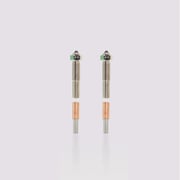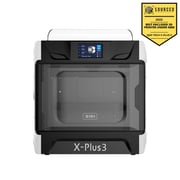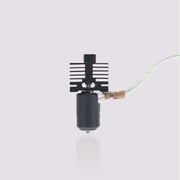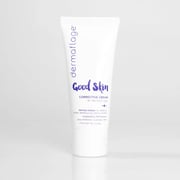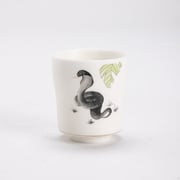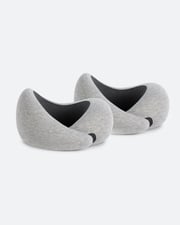
 QIDI Technology
QIDI TechnologyPPS-CF Filament
USD 104.99
Description
QIDI PPS-CF 3D Printer Filament PPS-CF is a composite material made from carbon fiber-reinforced polyphenylene sulfide (PPS). The combination of PPS resin with carbon fiber imparts excellent properties to PPS-CF, including outstanding solvent resistance, corrosion resistance, heat resistance, and flame retardancy. Additionally, higher printing temperatures enhance the strength, rigidity, and dimensional stability of PPS-CF. When paired with the QIDI Plus4, it becomes a specialty engineering plastic capable of meeting the demands of unique and challenging applications. Heat Resistance Up to 264℃ PPS-CF features a heat deflection temperature of up to 264°C at 0.45 MPa and can maintain continuous operation at temperatures above 200°C. Its superior heat resistance ensures excellent creep resistance, making PPS-CF an ideal choice for challenging industrial environments and high-temperature applications. Excellent Flame-resistant PPS-CF is rated UL-94 V-0 for flame retardancy, ensuring exceptional safety and reliability in key applications like electronics and automotive parts. Its outstanding durability provides lasting performance and confidence, even in the most challenging conditions. Top-tier Mechanical Properties PPS-CF integrates the rigidity of PPS polymers with the reinforcing power of carbon fibers, delivering superior stiffness, flexural strength, and tensile strength. Its outstanding dimensional stability and resistance to warping ensure that large-scale prints retain precision and remain distortion-free throughout production, making it perfect for high-precision applications. PET-CF PA12-CF PAHT-CF PPS-CF Bending Modulus 5345 MPa 3916 MPa 6727 MPa 7160 MPa Bending Strength 114 MPa 114 MPa 144 MPa 142 MPa Solvent and Chemical Resistance PPS-CF exhibits excellent solvent and chemical resistance. At temperatures below 200°C, it is virtually insoluble in any solvent and demonstrates outstanding resistance to acids, alkalis, and salts under normal conditions. This makes PPS-CF an ideal choice for demanding environments where high chemical stability is essential. Ultra-Low Water Absorption PPS-CF has an extremely low moisture absorption rate of just 0.05%, ensuring that its mechanical and thermal properties remain stable even in humid conditions. This makes it an optimal choice for applications that demand high moisture resistance. Dry State Wet State Impact Strength - XY 27.8 kJ/m² 27.8 kJ/m² Bending Strength - XY 142 MPa 142 MPa Bending Strength - Z 36 MPa 36 MPa Bending Modulus - XY 7160 MPa 7160 MPa Accessory Compatibility Recommended Not Recommended Build Plate QIDI PEI Plate, HF Plat, PC Plate and Smooth Plate / Hotend Hardened Steel Nozzle ( 0.4 / 0.6 / 0.8 mm) Bimetal Nozzle ( 0.4 / 0.6 / 0.8 mm) Brass/Copper plated Nozzle (0.2/0.4/0.6/0.8 mm) Glue Glue Stick/ 3D LAC adhesive spray / Recommended Printing Settings Drying Settings (Blast Drying Oven) 100-140 °C,8-12 h Printing and Keeping Container's Humidity < 20% RH (Sealed, with Desiccant) Nozzle Temperature 310-350 °C Bed Temperature (with Glue) 100 °C Printing Speed 30-100 mm/s Physical Properties Density 1.3 g/cm³ Vicat Softening Temperature 268 °C Heat Deflection Temperature 242.7 °C Melting Temperature 284 °C Melt flow rate 50-60 g/10 min Mechanical Properties Tensile Strength 55-65 MPa Breaking Elongation Rate >4-8 % Bending Modulus 7160 ± 280 MPa MPa Bending Strength 142 ± 5 MPa Impact Strength 27.8 ± 2.3 kJ/m² Downloads Filament TDS Filament MSDS Printing Tips 1. Using higher values within these ranges can enhance the mechanical properties of the printed parts, especially in the Z-direction. 2. Higher temperatures within the drying range yield better results, but do not exceed 160°C to avoid damaging the spool.3. To prevent the filament from absorbing moisture, use an airtight storage container with desiccant during printing.For more details please refer to: Filament Guide on WIKI.
QIDI Technology deal
You could save on QIDI Technology PPS-CF Filament with a QIDI Technology promo code:
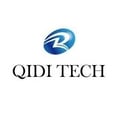
$20 off
worked about 2 months ago
